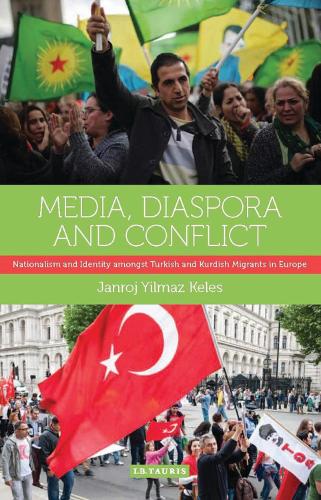
Media, Diaspora and Conflict: Nationalism and Identity amongst Turkish and Kurdish Migrants in Europe
(Hardback)
Publishing Details
Media, Diaspora and Conflict: Nationalism and Identity amongst Turkish and Kurdish Migrants in Europe
By (Author) Janroj Yilmaz Keles
Bloomsbury Publishing PLC
I.B. Tauris
21st August 2015
United Kingdom
Classifications
General
Non Fiction
Ethnic groups and multicultural studies
Social groups: religious groups and communities
Migration, immigration and emigration
Nationalism and nationalist ideologies and movements
Communication studies
940.0491597
Physical Properties
Hardback
280
Width 138mm, Height 216mm
471g
Description
For migrant communities residing outside of their home countries, various transnational media have played a key role in maintaining, reviving and transforming ethnic and religious identities. A vital element is how media outlets report and represent ethno-national conflict in the home country. Janroj Yilmaz Keles here examines how this plays out among Kurdish and Turkish communities in Europe. He offers an analysis of how Turkish and Kurdish migrants in Europe react to the myriad mediated narratives. A vital element is how media outlets report and represent the ethno-national conflict between the Turkish state and the Kurdish PKK.Janroj Yilmaz Keles here offers an examination of how Turkish and Kurdish migrants in Europe react to the myriad narratives that arise. Taking as his starting point an analysis of the nature of nationalisms in the modern age, Keles shows how language is often a central element in the struggle for hegemony within a state. The media has become a site for the clash of representations in both Turkish and Kurdish languages, especially for those based in the diaspora in Europe. These 'virtual communities', connected by television and the internet, in turn influence and are influenced by the way the conflict between the Turkish state and subaltern Kurds is played out, both in the media and on the ground.By looking at first, second and third generations of Turkish and Kurdish populations in Europe, Keles highlights the dynamics of migration, settlement and integration that often depend on the policies of each settlement country. Since these settlement states often see the proliferation of such media as an impediment to integration, Media, Diaspora and Conflict offers timely analysis concerning the nature of diasporas and the construction of identity.
Reviews
"This book makes an important contribution to diaspora media studies in general but its originality and particular significance lies in its rich empirical investigation of the intersections between Kurdish and Turkish nationalism and transnationalism, and the role of the media in conflict. Janroj Keles offers a study that is truly impressive in its scope and understanding but it is also a sobering account of banal transnationalism. He demonstrates how, paradoxically, transnational media de-territorialise Turkish and Kurdish ethno-national conflict but at the same time make that conflict an integral part of migrants' everyday lives in Europe. A must-read for scholars and students interested in the enduring significance and everyday mediation of ethno-national identities." - Marie Gillespie, Professor of Sociology, The Open University; "Sometimes when we witness a great idea at work, we wonder "why didn't anyone think of this before" I had this feeling reading Janroj Keles's book. He has used great works on nationalism and media, from thinkers like Benedict Anderson and Antonio Gramsci, to shed light on a phenomena many people may have noticed but not thought deeply enough about: the homeland nationalisms of diaspora communities. Whether speaking about Jews and Palestinians or Armenians, Sikhs, Irish and others, it often seems that communities far removed from their homelands harbor more rigid identities and less compromising national ideologies than their kin back home. In a clear yet theoretically informed analysis, Dr. Keles uses the Turkish and Kurdish cases to illuminate the phenomenon and show how transnational media plays a key role in this process. His study is based on extensive fieldwork and interviews with migrants. Readers interested in nationalism, media, migration and multiculturalism will of course have an interest in this study. In an increasingly globalized, interconnected world, however, this study should be of interest to just about anyone. In today's world, even someone who has never left their hometown likely has a neighbor, friend or colleague who has left their homeland yet still cares about events there deeply. Dr. Keles' book offers a good deal of insight into how and why this happens." - David Romano, Professor of Middle East Politics, Missouri State University
Author Bio
Janroj Yilmaz Keles is Research Fellow at Middlesex University and holds a PhD in Sociology and Communications from Brunel University. He has worked on projects for the Economic and Social Research Council and the EU Commission and has recently been awarded funding for his research by the Joseph Rowntree Foundation, The Organisation for Economic Co-operation and Development, and the British Institute for the Study of Iraq. He has been interviewed by various organizations including the BBC, Voice of Russia, and Kurdish, Turkish, Iranian and Arab media.
